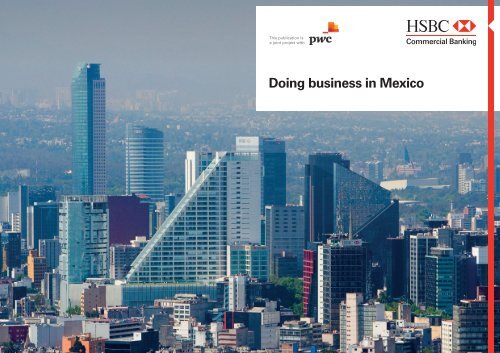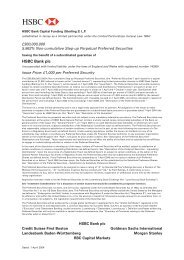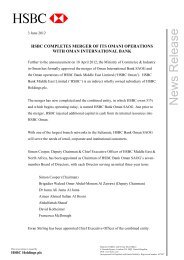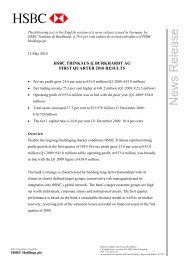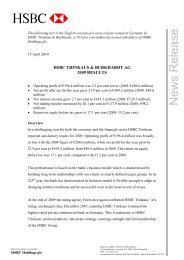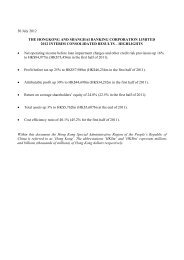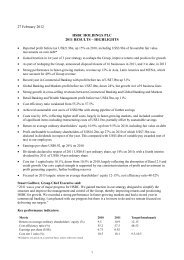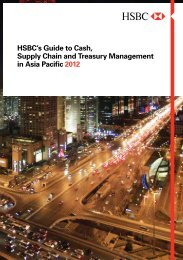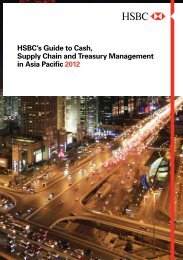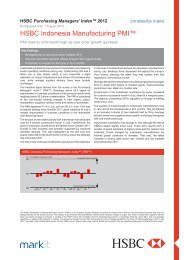HSBC Doing business in Mexico
HSBC Doing business in Mexico
HSBC Doing business in Mexico
Create successful ePaper yourself
Turn your PDF publications into a flip-book with our unique Google optimized e-Paper software.
This publication is<br />
a jo<strong>in</strong>t project with<br />
<strong>Do<strong>in</strong>g</strong> <strong>bus<strong>in</strong>ess</strong> <strong>in</strong> <strong>Mexico</strong>
Contents<br />
Executive summary 4<br />
Foreword 6<br />
Introduction – <strong>Do<strong>in</strong>g</strong> <strong>bus<strong>in</strong>ess</strong> <strong>in</strong> <strong>Mexico</strong> 8<br />
Conduct<strong>in</strong>g <strong>bus<strong>in</strong>ess</strong> <strong>in</strong> <strong>Mexico</strong> 12<br />
Taxation <strong>in</strong> <strong>Mexico</strong> 18<br />
Audit and accountancy 24<br />
Human Resources and Employment Law 26<br />
Trade 30<br />
Bank<strong>in</strong>g <strong>in</strong> <strong>Mexico</strong> 32<br />
<strong>HSBC</strong> <strong>in</strong> <strong>Mexico</strong> 34<br />
Country overview 36<br />
Contacts 38<br />
Disclaimer<br />
This document is issued by <strong>HSBC</strong><br />
<strong>Mexico</strong> (the ‘bank’) <strong>in</strong> <strong>Mexico</strong>.<br />
It is not <strong>in</strong>tended as an offer or<br />
solicitation for <strong>bus<strong>in</strong>ess</strong> to anyone<br />
<strong>in</strong> any jurisdiction. It is not <strong>in</strong>tended<br />
for distribution to anyone located<br />
<strong>in</strong> or resident <strong>in</strong> jurisdictions which<br />
restrict the distribution of this<br />
document. It shall not be copied,<br />
reproduced, transmitted or further<br />
distributed by any recipient.<br />
The <strong>in</strong>formation conta<strong>in</strong>ed <strong>in</strong><br />
this document is of a general<br />
nature only. It is not meant to<br />
be comprehensive and does not<br />
constitute f<strong>in</strong>ancial, legal, tax or<br />
other professional advice. You<br />
should not act upon the <strong>in</strong>formation<br />
conta<strong>in</strong>ed <strong>in</strong> this publication without<br />
obta<strong>in</strong><strong>in</strong>g specific professional<br />
advice. This document is produced<br />
by the Bank together with<br />
PricewaterhouseCoopers<br />
(‘PwC’). Whilst every care has<br />
been taken <strong>in</strong> prepar<strong>in</strong>g this<br />
document, neither the Bank<br />
nor PwC makes any guarantee,<br />
representation or warranty<br />
(express or implied) as to its<br />
accuracy or completeness, and<br />
under no circumstances will the<br />
Bank or PwC be liable for any<br />
loss caused by reliance on any<br />
op<strong>in</strong>ion or statement made <strong>in</strong> this<br />
document. Except as specifically<br />
<strong>in</strong>dicated, the expressions of op<strong>in</strong>ion<br />
are those of the Bank and/or PwC<br />
only and are subject to change<br />
without notice.<br />
The materials conta<strong>in</strong>ed <strong>in</strong> this<br />
publication were assembled<br />
<strong>in</strong> November 2011 and were<br />
based on the law enforceable and<br />
<strong>in</strong>formation available at that time.
4<br />
Executive summary<br />
<strong>Mexico</strong> offers an attractive<br />
<strong>bus<strong>in</strong>ess</strong> environment, legal<br />
certa<strong>in</strong>ty, one of the world’s<br />
largest free trade agreement<br />
networks, as well as highly<br />
developed economic sectors<br />
that offer very competitive<br />
costs. The country is<br />
committed to develop<strong>in</strong>g<br />
its <strong>in</strong>frastructure <strong>in</strong> order to<br />
create a world-class logistics<br />
platform suitable for<br />
<strong>in</strong>ternational <strong>bus<strong>in</strong>ess</strong>es.<br />
The government of <strong>Mexico</strong><br />
is also <strong>in</strong>vest<strong>in</strong>g <strong>in</strong> <strong>in</strong>itiatives<br />
to simplify regulations<br />
applicable to <strong>in</strong>ternational<br />
<strong>bus<strong>in</strong>ess</strong>es. Specifically, the<br />
Mexican Government supports<br />
foreign <strong>in</strong>vestments through<br />
different public <strong>in</strong>stitutions<br />
which advise, support and<br />
facilitate various <strong>bus<strong>in</strong>ess</strong><br />
transactions <strong>in</strong> <strong>Mexico</strong>.<br />
In 2010, <strong>Mexico</strong> has been<br />
favoured by large amounts of<br />
foreign direct <strong>in</strong>vestment, <strong>in</strong><br />
the automotive, manufactur<strong>in</strong>g,<br />
aviation, <strong>in</strong>formation technology<br />
and tourism sectors.<br />
<strong>Mexico</strong> is today´s opportunity<br />
• Strategic geographic location.<br />
• Competitive labour costs.<br />
• Accessibility to large markets.<br />
• Low operation and<br />
transportation costs.<br />
• Young, talented and highly<br />
qualified population.<br />
• Economic stability<br />
and its favourable<br />
<strong>bus<strong>in</strong>ess</strong> environment.<br />
• Wide network of free<br />
trade agreements.<br />
• Legal certa<strong>in</strong>ty for<br />
foreign <strong>in</strong>vestment.<br />
• Strong and dynamic<br />
manufactur<strong>in</strong>g <strong>in</strong>dustries.<br />
• Internal market.<br />
• Infrastructure and logistic<br />
abilities for <strong>in</strong>dustry.
6<br />
Foreword<br />
Accord<strong>in</strong>g to <strong>HSBC</strong>’s Report<br />
‘The World <strong>in</strong> 2050’, <strong>Mexico</strong><br />
will be the eigth largest<br />
economy of the world <strong>in</strong> 2050.<br />
Free Trade Agreements with<br />
47 nations all around the world<br />
support <strong>Mexico</strong>’s status as a<br />
very attractive trade hub.<br />
A strategic geographic location<br />
<strong>in</strong> the North American region<br />
provides a reduction <strong>in</strong> costs of<br />
<strong>in</strong>ventory, transportation and<br />
shipp<strong>in</strong>g for companies located<br />
<strong>in</strong> NAFTA countries. Trucks<br />
can deliver merchandise and<br />
products to any po<strong>in</strong>t <strong>in</strong> the<br />
U.S. with<strong>in</strong> 24 hours.<br />
<strong>Mexico</strong>’s policy objectives<br />
to <strong>in</strong>crease its productivity,<br />
efficiency and quality standards,<br />
have transformed <strong>Mexico</strong> <strong>in</strong>to<br />
one of the world’s lead<strong>in</strong>g<br />
manufactur<strong>in</strong>g countries.<br />
Highly developed<br />
telecommunications systems,<br />
<strong>in</strong>clud<strong>in</strong>g domestic and<br />
<strong>in</strong>ternational fibre-optic<br />
and satellite systems, keep<br />
<strong>bus<strong>in</strong>ess</strong>es connected on a<br />
national and global scale to<br />
meet <strong>bus<strong>in</strong>ess</strong> demands.<br />
Government macroeconomic<br />
policies encourage foreign<br />
<strong>in</strong>vestment and a stable<br />
economic and political<br />
environment sought by<br />
<strong>in</strong>vestors worldwide.<br />
<strong>Mexico</strong> represents a potential<br />
consumer base of 112 million<br />
<strong>in</strong>dividuals whose average<br />
yearly <strong>in</strong>come cont<strong>in</strong>ues to rise<br />
steadily, as does their appetite<br />
for consumer products of all<br />
k<strong>in</strong>ds. Its employment rate is<br />
also on the rise, contribut<strong>in</strong>g<br />
to the economic growth of the<br />
nation. Foreign and domestic<br />
demand is <strong>in</strong>creas<strong>in</strong>g, and GDP<br />
per capita doubles the average<br />
of GDP per capita <strong>in</strong> the BRIC<br />
countries.<br />
The country’s young, skilled<br />
and plentiful workforce (60%<br />
under age 25) performs at<br />
world-class productivity levels.<br />
An abundance of valuable<br />
raw materials throughout the<br />
country supports a healthy<br />
’bottom l<strong>in</strong>e’ for <strong>in</strong>vest<strong>in</strong>g firms.<br />
<strong>Mexico</strong> is the perfect location<br />
for companies desir<strong>in</strong>g to<br />
cost-effectively sell products<br />
and services to consumers<br />
liv<strong>in</strong>g <strong>in</strong> North, Central and<br />
South American as well as<br />
the Caribbean.<br />
<strong>Mexico</strong> has provided <strong>HSBC</strong><br />
with the opportunity to create<br />
a solid platform for further<br />
expansion of the <strong>bus<strong>in</strong>ess</strong> <strong>in</strong><br />
Lat<strong>in</strong> America, a region that is<br />
almost comparable to Ch<strong>in</strong>a <strong>in</strong><br />
terms of GDP and consumption.<br />
<strong>HSBC</strong> has made <strong>Mexico</strong> its<br />
f<strong>in</strong>ancial hub for Lat<strong>in</strong> America,<br />
where it headquarters its<br />
Lat<strong>in</strong> American <strong>bus<strong>in</strong>ess</strong>.<br />
<strong>HSBC</strong> <strong>Mexico</strong> is the fourth<br />
largest bank <strong>in</strong> deposits. It<br />
has 1,186 branches and 6,500<br />
ATMs, the largest network <strong>in</strong><br />
the country.<br />
Currently, <strong>HSBC</strong> has 8 million<br />
customers and more than<br />
19,500 employees.<br />
<strong>Mexico</strong> is, and will cont<strong>in</strong>ue<br />
to be, an important player<br />
<strong>in</strong> the global economy due<br />
to its openness, size and<br />
opportunities. We at <strong>HSBC</strong> are<br />
excited about the prospects to<br />
cont<strong>in</strong>ue grow<strong>in</strong>g our <strong>bus<strong>in</strong>ess</strong>,<br />
and we would encourage you<br />
to do the same.<br />
Luis Peña-Kegel<br />
Chief Executive Officer<br />
<strong>HSBC</strong> <strong>Mexico</strong>
8<br />
Introduction<br />
<strong>Do<strong>in</strong>g</strong> <strong>bus<strong>in</strong>ess</strong> <strong>in</strong> <strong>Mexico</strong><br />
Located <strong>in</strong> the North American<br />
subcont<strong>in</strong>ent, <strong>Mexico</strong> is framed<br />
by the U.S. to the North,<br />
Guatemala and Belize to the<br />
south, the Gulf of <strong>Mexico</strong> to the<br />
east and the Pacific Ocean to the<br />
west. The country’s official name<br />
is Estados Unidos Mexicanos<br />
(United States of <strong>Mexico</strong>), its<br />
official language is Spanish,<br />
with only a small portion of its<br />
population boast<strong>in</strong>g a command<br />
of English. Its functional<br />
currency is the Mexican peso.<br />
<strong>Mexico</strong> is a Federal Republic<br />
comprised of 31 States and a<br />
Federal District (<strong>Mexico</strong> City)<br />
with its political system made up<br />
of three levels of government,<br />
federal, state and municipal,<br />
and government made up of<br />
three powers; the executive<br />
(President), the legislative and<br />
the judicial.<br />
For over 50 years, the ma<strong>in</strong><br />
eng<strong>in</strong>e power<strong>in</strong>g <strong>Mexico</strong>’s<br />
economy has been crude<br />
extraction and exportation;<br />
however, more recently, other<br />
factors have emerged that<br />
have grown over time, such as<br />
remittances sent back to <strong>Mexico</strong><br />
by Mexican residents <strong>in</strong> the<br />
U.S., and also the transformation<br />
<strong>in</strong>dustry (e.g. automotive,<br />
textile, electronics) and sectors<br />
such as tourism, construction,<br />
telecommunications have been<br />
grow<strong>in</strong>g <strong>in</strong> the last decade.<br />
Economic environment<br />
Nearly 25 years ago, <strong>Mexico</strong><br />
embarked on a path towards<br />
greater economic openness,<br />
with an emphasis on open<strong>in</strong>g<br />
itself to foreign trade and on<br />
attract<strong>in</strong>g foreign <strong>in</strong>vestment.<br />
Throughout this period, many<br />
significant changes were made<br />
to the Foreign Investment Law.<br />
Free trade agreements were<br />
signed with the most important<br />
economies worldwide (the<br />
North American Free Trade<br />
Agreement, the Free Trade<br />
Agreements with the European<br />
Union and Japan, among<br />
others), as well as a number<br />
of tax treaties to avoid double<br />
taxation, signed with more<br />
than 30 countries.<br />
<strong>Mexico</strong> has reached a<br />
consistent, solid and stable<br />
macroeconomic framework, as<br />
a result of the monetary policy<br />
implemented by Banco de<br />
<strong>Mexico</strong> (Central Bank) and the<br />
F<strong>in</strong>ance M<strong>in</strong>istry, thus allow<strong>in</strong>g<br />
for certa<strong>in</strong>ty <strong>in</strong> the decision<br />
mak<strong>in</strong>g of companies seek<strong>in</strong>g<br />
to <strong>in</strong>vest <strong>in</strong> <strong>Mexico</strong>. In addition,<br />
the country is mov<strong>in</strong>g forward<br />
<strong>in</strong> terms of <strong>in</strong>frastructure,<br />
seek<strong>in</strong>g to balance a worldclass<br />
logistics platform to<br />
further facilitate <strong>bus<strong>in</strong>ess</strong><br />
operations by tak<strong>in</strong>g advantage<br />
of its geographic location.<br />
Accord<strong>in</strong>g to the most recent<br />
report on global competitiveness<br />
issued by the World Economic<br />
Forum (WEF), <strong>in</strong> terms of the<br />
macroeconomic stability sub<strong>in</strong>dex<br />
rank, which measures<br />
five variables (public f<strong>in</strong>ances,<br />
domestic sav<strong>in</strong>gs rate, <strong>in</strong>terest<br />
rate differential and public debt),<br />
<strong>Mexico</strong> improved its position<br />
by 20 places between 2008<br />
and 2009, mov<strong>in</strong>g from the<br />
48th position (of an overall 133<br />
countries) to the 28th.<br />
In summary, <strong>Mexico</strong> boasts:<br />
85 airports (26 national<br />
and 59 <strong>in</strong>ternational), 16<br />
<strong>in</strong>ternational sea ports, 27,000<br />
km of railways and 123,000 km<br />
of ma<strong>in</strong> highways.<br />
In order to contribute to<br />
<strong>in</strong>creas<strong>in</strong>g the country’s<br />
competitiveness, the Federal<br />
Government <strong>in</strong>creased its<br />
<strong>in</strong>vestment <strong>in</strong> <strong>in</strong>frastructure<br />
from 3% of the GDP to 5%<br />
over the past three years,<br />
through its most important<br />
<strong>in</strong>frastructure programme<br />
<strong>in</strong> decades.<br />
<strong>Mexico</strong> recorded a population<br />
112.4 million <strong>in</strong> 2010, 45.7<br />
million of which is classified<br />
as the country’s Economically<br />
Active Population. The forecast<br />
is for the number to double<br />
over a 30-year period.<br />
One of the most important<br />
A challenge for the Mexican<br />
economy is to consolidate<br />
the country’s recovery <strong>in</strong><br />
production and employment.<br />
To strengthen this process,<br />
Mexican products must be<br />
better positioned <strong>in</strong> <strong>in</strong>ternational<br />
markets and greater foreign<br />
<strong>in</strong>vestment must be attracted.
10<br />
Open<strong>in</strong>g a <strong>bus<strong>in</strong>ess</strong><br />
The procedures and time<br />
required to open and close a<br />
company, as well as the red<br />
tape and time required to obta<strong>in</strong><br />
construction permits are key<br />
and possibly critical factors <strong>in</strong><br />
the success of <strong>in</strong>ternational<br />
<strong>bus<strong>in</strong>ess</strong>es. In <strong>Mexico</strong>, an<br />
<strong>in</strong>vestor is only required to<br />
conduct 8 procedures tak<strong>in</strong>g<br />
no more than 13 days to<br />
open a company. Obta<strong>in</strong><strong>in</strong>g a<br />
construction permit only takes<br />
12 procedures over a period of<br />
138 days, which is favourable<br />
compared to other countries.<br />
Clos<strong>in</strong>g down a company<br />
requires only a two-day notice<br />
period. Additionally, the recovery<br />
rate related to clos<strong>in</strong>g down a<br />
<strong>bus<strong>in</strong>ess</strong> is 64.3%, which is also<br />
comparably favourable.<br />
Favourable exchange<br />
performance<br />
With<strong>in</strong> the next few years,<br />
<strong>Mexico</strong> will enjoy better<br />
exchange performance <strong>in</strong> real<br />
terms compared to many of<br />
the countries aga<strong>in</strong>st which<br />
it competes <strong>in</strong> <strong>in</strong>ternational<br />
markets, as the exchange<br />
performance of the Mexican<br />
peso aga<strong>in</strong>st the US dollar<br />
and the Euro has rema<strong>in</strong>ed<br />
stable, as compared to<br />
Asian countries. In light of<br />
the above, a wide range of<br />
<strong>bus<strong>in</strong>ess</strong> opportunities is<br />
open<strong>in</strong>g up <strong>in</strong> the short and<br />
medium term that will allow<br />
the <strong>in</strong>crease <strong>in</strong> profitability and<br />
the position<strong>in</strong>g of <strong>Mexico</strong>’s<br />
products <strong>in</strong> <strong>in</strong>ternational<br />
markets, by consider<strong>in</strong>g<br />
<strong>Mexico</strong> as a base for<br />
operations and exportations.<br />
Competitive labour costs<br />
12 commercial agreements<br />
signed with 44 nations makes<br />
<strong>Mexico</strong> one of the country’s<br />
most open to <strong>in</strong>ternational<br />
trade <strong>in</strong> the world and<br />
with preferential access to<br />
more than a billion potential<br />
consumers (with <strong>in</strong>come<br />
equivalent to 60% of the<br />
world’s GDP).<br />
Free Trade Agreements<br />
network and commercial<br />
procedures<br />
12 commercial agreements<br />
signed with 44 nations makes<br />
<strong>Mexico</strong> one of the countries<br />
most open to <strong>in</strong>ternational<br />
trade <strong>in</strong> the world and with<br />
preferential access to more<br />
than a billion potential<br />
consumers (with <strong>in</strong>come<br />
equivalent to 60% of the<br />
world’s GDP).<br />
Low transportation costs<br />
Another advantage is its<br />
proximity to the world’s ma<strong>in</strong><br />
consumer centres. This is<br />
relevant, as it allows companies<br />
to respond more rapidly to<br />
changes <strong>in</strong> demand and it<br />
reduces the cost of <strong>in</strong>ventories.<br />
Incentives for<br />
foreign <strong>in</strong>vestors<br />
• Corporate tax rate: <strong>Mexico</strong> has<br />
a competitive tax rate (30%)<br />
compared to other territories.<br />
• Number of tax payments:<br />
<strong>Mexico</strong> requires only 6<br />
payments a year.<br />
• Tra<strong>in</strong>ed personnel: In <strong>Mexico</strong>,<br />
approximately 90 thousand<br />
students graduate with<br />
eng<strong>in</strong>eer<strong>in</strong>g and technological<br />
degrees every year. Mexican<br />
universities offer more than<br />
900 eng<strong>in</strong>eer<strong>in</strong>g and<br />
technology-related<br />
postgraduate programmes.<br />
• Tax Depreciation: The Mexican<br />
government allows for<br />
accelerated tax depreciation <strong>in</strong><br />
the production of materials of<br />
92% of the <strong>in</strong>vestment value.<br />
Regulatory framework<br />
of Foreign Investments<br />
<strong>in</strong> <strong>Mexico</strong><br />
In <strong>Mexico</strong>, there is a law that<br />
regulates foreign <strong>in</strong>vestment,<br />
which also establishes the<br />
economic activities that<br />
are exclusively reserved for<br />
the Government, and also<br />
establishes those activities<br />
reserved to Mexican nationals<br />
or companies, as well as the<br />
activities subject to specific<br />
regulation to allow for foreign<br />
<strong>in</strong>vestment.<br />
Activities reserved exclusively<br />
for the Government<br />
The activities reserved<br />
exclusively for the Government,<br />
as established by law are:<br />
• Oil and other hydrocarbons.<br />
• Basic petrochemicals.<br />
• Electrical power.<br />
• Generation of nuclear power.<br />
• Radioactive m<strong>in</strong>erals.<br />
• Telegraph service.<br />
• Radiotelegraph services.<br />
• Mail service.<br />
• Issuance of bank notes.<br />
• Co<strong>in</strong> m<strong>in</strong>t<strong>in</strong>g.<br />
• Control, supervision and<br />
surveillance of airports<br />
and heliports.<br />
Activities reserved exclusively<br />
for Mexican nationals<br />
The follow<strong>in</strong>g economic<br />
activities and entities are<br />
reserved exclusively to<br />
Mexican nationals or Mexican<br />
companies, with a clause<br />
for the exclusion of foreign<br />
nationals:<br />
• Domestic land transportation of<br />
passengers, tourism and cargo,<br />
not <strong>in</strong>clud<strong>in</strong>g courier services.<br />
• Radio broadcast<strong>in</strong>g<br />
services and other radio<br />
and television services,<br />
other than cable television.<br />
• Credit unions.<br />
• Retail<strong>in</strong>g of gasol<strong>in</strong>e and<br />
distribution of liquefied<br />
petroleum gas.<br />
• Development bank<strong>in</strong>g<br />
<strong>in</strong>stitutions, <strong>in</strong> the terms<br />
of the correspond<strong>in</strong>g law<br />
1. AMIA (Mexican Association of<br />
Automotive Industry).<br />
• Professional and technical<br />
services, expressly <strong>in</strong>dicat<strong>in</strong>g<br />
the applicable legal provisions.<br />
Activities subject to<br />
specific regulation<br />
Activities subject to specific<br />
regulation must be authorised<br />
by the Foreign Investment<br />
National Commission.<br />
Depend<strong>in</strong>g on the activity, the<br />
sharehold<strong>in</strong>g percentage <strong>in</strong> the<br />
<strong>in</strong>vestment may vary from 10%<br />
to a 100% <strong>in</strong>terest.<br />
Key markets and trade<br />
<strong>Mexico</strong>’s most significant<br />
<strong>in</strong>dustries are:<br />
• Automobile <strong>in</strong>dustry –<br />
manufactur<strong>in</strong>g more than 2.260<br />
million vehicles (2010) 1 , 7 of<br />
the 10 largest producers <strong>in</strong> the<br />
world have plants <strong>in</strong> <strong>Mexico</strong>,<br />
and there is a presence of<br />
more than 90% of car-parts<br />
manufacturers.<br />
• Aerospace <strong>in</strong>dustry – there<br />
are more than 200 companies<br />
related to this <strong>in</strong>dustry, with<br />
exports valued at 3.1 billion<br />
dollars, and competitive and<br />
specialised labour.<br />
• Processed foods – Added<br />
value <strong>in</strong> this <strong>in</strong>dustry reaches<br />
more than 42,560 million<br />
dollars (2008), exports exceed<br />
9 billion dollars. Over the past<br />
10 years, <strong>Mexico</strong> has attracted<br />
direct foreign <strong>in</strong>vestment <strong>in</strong><br />
excess of 18.9 billion dollars.<br />
• Tourism – There are over one<br />
million Americans liv<strong>in</strong>g <strong>in</strong><br />
<strong>Mexico</strong>. There is the potential<br />
of hav<strong>in</strong>g 10% of U.S. retirees<br />
mov<strong>in</strong>g to <strong>Mexico</strong>, availability<br />
of modern services, access to<br />
quality health services, good<br />
real estate opportunities and a<br />
wide range of attractions.<br />
• M<strong>in</strong><strong>in</strong>g – A production value<br />
of around 11,200 million<br />
dollars <strong>in</strong> 2008, exports of<br />
1.9 billion dollars. The ma<strong>in</strong><br />
products <strong>in</strong> <strong>Mexico</strong> are<br />
copper, gold, silver, z<strong>in</strong>c and<br />
gravel, over 3.6 billion dollars<br />
<strong>in</strong> direct foreign <strong>in</strong>vestment<br />
<strong>in</strong> 2008.<br />
Aerospace, automobile<br />
manufactur<strong>in</strong>g and tourism<br />
rema<strong>in</strong> the most attractive<br />
<strong>in</strong>dustries for the future<br />
<strong>in</strong> <strong>Mexico</strong>, aside from<br />
renewable energy, life<br />
sciences, professional<br />
services, software and digital<br />
contents <strong>in</strong>dustries.<br />
Bus<strong>in</strong>ess Etiquette<br />
Mexican <strong>bus<strong>in</strong>ess</strong> people are<br />
used to conduct<strong>in</strong>g <strong>bus<strong>in</strong>ess</strong><br />
on a personal basis, as they<br />
consider it important to meet<br />
the person with whom they<br />
are to ma<strong>in</strong>ta<strong>in</strong> a commercial<br />
relationship. In addition, it is<br />
also customary to formalise<br />
the commercial relationship by<br />
sign<strong>in</strong>g an agreement requir<strong>in</strong>g<br />
that both parties comply with<br />
the obligations set out there<strong>in</strong>.
12<br />
Conduct<strong>in</strong>g <strong>bus<strong>in</strong>ess</strong> <strong>in</strong> <strong>Mexico</strong><br />
Forms of <strong>bus<strong>in</strong>ess</strong><br />
For purposes of the FIA, foreign<br />
<strong>in</strong>vestment is considered to be:<br />
a. The participation of foreign<br />
<strong>in</strong>vestors to any extent, <strong>in</strong><br />
the capital stock of Mexican<br />
companies;<br />
b. Most Mexican companies<br />
with foreign capital; and<br />
c. Foreign <strong>in</strong>vestor participation<br />
<strong>in</strong> the activities and events<br />
covered by FIA.<br />
Overall, there are three<br />
recognised ways of carry<strong>in</strong>g<br />
out <strong>in</strong>vestment projects:<br />
a. By sett<strong>in</strong>g up a foreign<br />
<strong>in</strong>vestment entity <strong>in</strong> <strong>Mexico</strong>,<br />
which can take the form of<br />
a branch or representative<br />
office. These are entities legally<br />
constituted abroad and legally<br />
recognised <strong>in</strong> <strong>Mexico</strong>.<br />
b. By establish<strong>in</strong>g a Mexican<br />
company with up to 100%<br />
capital stock held by foreigners.<br />
The Corporations Law<br />
(GLMC) acknowledges<br />
six types of companies.<br />
• General Partnership.<br />
• Limited Partnership.<br />
• Limited Liability Corporation.<br />
• Corporation.<br />
• Limited Liability Partnership.<br />
• Cooperatives.<br />
Any of those companies can<br />
be <strong>in</strong>corporated as a company<br />
with variable capital stock.<br />
In corporations and limited<br />
liability corporations, the<br />
partners will be liable only to<br />
the extent of their contributions.<br />
There are other mixed liability<br />
companies, such as limited<br />
partnerships and limited liability<br />
partnerships, where some<br />
members are liable without<br />
limitations for the company’s<br />
obligations and others are only<br />
obligated to the extent of their<br />
contributions.<br />
c. Through a Mexican corporation<br />
that is subject to specific<br />
regulation. The participation<br />
of foreign <strong>in</strong>dividuals or legal<br />
entities as m<strong>in</strong>ority shareholders<br />
or through a Neutral Investment<br />
Scheme is a possibility <strong>in</strong><br />
the event that economic<br />
activity is <strong>in</strong>tended to be<br />
conducted, subject to ceil<strong>in</strong>gs<br />
on participation. The Economic<br />
Secretary may authorise<br />
trusts to issue <strong>in</strong>vestment<br />
<strong>in</strong>struments, provided they<br />
have no vot<strong>in</strong>g rights.<br />
Activities subject to<br />
specific regulations<br />
Foreign <strong>in</strong>vestment allowed<br />
<strong>in</strong> the follow<strong>in</strong>g areas and<br />
companies is as follows:
14<br />
Up to 10% Cooperative companies for production.<br />
Up to 25% Domestic air transportation.<br />
Aero taxi transportation.<br />
Specialised air transportation.<br />
Up to 49% Insurance companies.<br />
Bond<strong>in</strong>g companies.<br />
Currency exchange houses.<br />
Bonded warehouses.<br />
The companies referred to <strong>in</strong> article 12b of the Mexican Securities Market Law.<br />
Retirement Fund Adm<strong>in</strong>istrators.<br />
Manufacture and market<strong>in</strong>g of explosives, firearms, cartridges, ammunition and<br />
fireworks, not <strong>in</strong>clud<strong>in</strong>g acquisition and use of explosives for <strong>in</strong>dustrial and extract<strong>in</strong>g<br />
activities or the preparation of explosive blends for use <strong>in</strong> said activities.<br />
Pr<strong>in</strong>t<strong>in</strong>g and publication of newspapers for circulation solely throughout <strong>Mexico</strong>.<br />
'T' class shares of companies own<strong>in</strong>g land for agricultural, livestock and<br />
forestry purposes.<br />
Fish<strong>in</strong>g <strong>in</strong> fresh water and coastal areas and exclusive economic zones,<br />
exclud<strong>in</strong>g aquaculture.<br />
Integral port management.<br />
Port pilot services for coastal navigation of vessels pursuant to the applicable laws.<br />
Shipp<strong>in</strong>g companies engaged <strong>in</strong> the commercial exploitation of vessels for coastal<br />
shipp<strong>in</strong>g or coastal trade, except for tourist cruise ships and the exploitation of drills<br />
and naval devices for the construction, conservation and operation of ports.<br />
Oil and lubricant supply for ships, aircraft and railroad.<br />
Telecommunications Concessionaires as provided by articles 11 and 12 of the Federal<br />
Telecommunications Law.<br />
More than 49% (once<br />
approval has been granted<br />
by the National Foreign<br />
Investment Commission)<br />
Port services for <strong>in</strong>land navigation of vessels, such as tow<strong>in</strong>g, moor<strong>in</strong>g and barg<strong>in</strong>g.<br />
Shipp<strong>in</strong>g companies exclusively operat<strong>in</strong>g on the high seas.<br />
Companies with a concession or permit for public service aerodromes.<br />
Private education services for pre-school, elementary, middle school, high school,<br />
college or any comb<strong>in</strong>ation thereof.<br />
Legal Services.<br />
Credit Information companies.<br />
Securities rat<strong>in</strong>g <strong>in</strong>stitutions.<br />
Insurance agents.<br />
Mobile telephony.<br />
Construction of pipel<strong>in</strong>es for oil and oil by-products.<br />
Drill<strong>in</strong>g oil and gas wells.<br />
Construction, operation and exploitation of railroads (general means of<br />
communication) and public railway services.<br />
Sett<strong>in</strong>g up a <strong>bus<strong>in</strong>ess</strong><br />
General requirements<br />
The first steps that a potential<br />
<strong>in</strong>vestor or <strong>bus<strong>in</strong>ess</strong> visitor <strong>in</strong><br />
<strong>Mexico</strong> must take are as follows:<br />
1. An <strong>in</strong>vitation on headed paper<br />
must be issued, written <strong>in</strong> or<br />
translated <strong>in</strong>to Spanish, by the<br />
respective trade or <strong>in</strong>dustry<br />
chamber, <strong>bus<strong>in</strong>ess</strong> association,<br />
public or private organisation,<br />
or by an <strong>in</strong>dustrial or <strong>bus<strong>in</strong>ess</strong><br />
company or a f<strong>in</strong>ancial<br />
<strong>in</strong>stitution, stat<strong>in</strong>g the purpose<br />
of the visit and declar<strong>in</strong>g that<br />
the foreign party has sufficient<br />
f<strong>in</strong>ancial back-up to cover their<br />
expenses <strong>in</strong> <strong>Mexico</strong> at any<br />
location with<strong>in</strong> the country<br />
where <strong>bus<strong>in</strong>ess</strong> is to be<br />
conducted (company affiliates).<br />
2. F<strong>in</strong>ancial solvency must be<br />
proven with a bank letter<br />
demonstrat<strong>in</strong>g that the party<br />
will have available, every<br />
month dur<strong>in</strong>g the year <strong>in</strong> which<br />
the visit will take place, an<br />
amount equal to 500 days of<br />
the m<strong>in</strong>imum wage of <strong>Mexico</strong><br />
City, or a f<strong>in</strong>ancial solvency<br />
letter from the party’s pr<strong>in</strong>cipal<br />
employer for the term of his/<br />
her stay <strong>in</strong> <strong>Mexico</strong>.<br />
3. If the applicant is a <strong>bus<strong>in</strong>ess</strong><br />
entity or an <strong>in</strong>dividual with<br />
<strong>bus<strong>in</strong>ess</strong> activities, he/she/it<br />
must submit:<br />
• The company’s articles<br />
of <strong>in</strong>corporation.<br />
• A certificate issued by a public<br />
notary stat<strong>in</strong>g the company<br />
name, <strong>bus<strong>in</strong>ess</strong> purpose and<br />
official tax domicile.<br />
• The most recent tax return<br />
filed (e-receipt of the last tax<br />
return filed).<br />
• A certificate from the National<br />
Foreign Investment Registry.<br />
• Registration at the respective<br />
chamber, association or<br />
organisation.<br />
• These requirements are not<br />
applicable to government<br />
entities or agencies or to public<br />
higher education <strong>in</strong>stitutions.<br />
• In the event that the <strong>in</strong>dividual<br />
with <strong>bus<strong>in</strong>ess</strong> activities is a<br />
foreign national, he/she must<br />
submit valid immigration papers.<br />
Establish<strong>in</strong>g a<br />
Mexican operation<br />
Foreign <strong>in</strong>vestors may:<br />
• Hold equity <strong>in</strong> Mexican<br />
corporations or partnerships;<br />
• Acquire fixed assets;<br />
• Enter new fields of economic<br />
activity or manufacture new<br />
l<strong>in</strong>es of products;<br />
• Open and operate<br />
establishments (branch<br />
offices, agencies);<br />
• Expand or relocate exist<strong>in</strong>g<br />
establishments (jo<strong>in</strong>t ventures).<br />
Incorporation of a company<br />
Companies will be <strong>in</strong>corporated<br />
<strong>in</strong> the presence of a notary and<br />
the amendments to the by-laws<br />
shall also be recorded. The public<br />
notary will not authorise the<br />
deed when the by-laws or the<br />
amendments thereto contravene<br />
the provisions of the General<br />
Law of Mercantile Corporations.<br />
The General Law of Mercantile<br />
Corporations acknowledges<br />
legal stand<strong>in</strong>g of foreign<br />
mercantile corporations that<br />
are duly <strong>in</strong>corporated.<br />
Foreign companies can only<br />
carry out <strong>bus<strong>in</strong>ess</strong> <strong>in</strong> <strong>Mexico</strong><br />
upon registration <strong>in</strong> the Public<br />
Registry of Commerce, which<br />
registration shall take place<br />
prior authorisation of the<br />
M<strong>in</strong>istry of Economy pursuant<br />
to Articles 17 and 17a of the<br />
Foreign Investment Law.<br />
Corporations<br />
The S.A. and S.A. de C.V.<br />
must have a m<strong>in</strong>imum of two<br />
shareholders. The m<strong>in</strong>imum<br />
capital amount for a S.A. is<br />
Mex$50,000, which must be<br />
fully subscribed with<strong>in</strong> one<br />
year from the establishment<br />
of the company. At least 20%<br />
of the value of each share<br />
must be paid <strong>in</strong> cash; the<br />
balance may be paid with any<br />
other assets.
16<br />
5% of a corporation’s annual<br />
net <strong>in</strong>come must be allocated<br />
annually to a legal account<strong>in</strong>g<br />
reserve until the reserve equals<br />
20% of the value of all issued<br />
and outstand<strong>in</strong>g capital stock. If<br />
the reserve is reduced for any<br />
reason, it must be restored to<br />
the 20% level.<br />
Any resolution taken by<br />
the Management of the<br />
Corporation (Board of Directors<br />
or Sole Director) or by the<br />
Shareholders that resolves<br />
not to allocate the 5% as<br />
m<strong>in</strong>imum to a legal account<strong>in</strong>g<br />
reserve is <strong>in</strong>valid. If this is the<br />
case, the Management of<br />
the Corporation has unlimited<br />
liability and liability <strong>in</strong> whole for<br />
the amount not allocated.<br />
Partnerships<br />
A m<strong>in</strong>imum number of two<br />
partners is required for the<br />
S. de R.L. and S. de R.L. de<br />
C.V., with a maximum of<br />
50 partners. The m<strong>in</strong>imum<br />
capital amount for a S. de<br />
R.L. is Mex$3,000, which<br />
must be fully subscribed at<br />
the establishment of the<br />
partnership. At least 50% of<br />
the value of each partnership<br />
<strong>in</strong>terest must be paid <strong>in</strong> cash;<br />
the balance may be paid with<br />
any other assets.<br />
Jo<strong>in</strong>t ventures<br />
Bus<strong>in</strong>ess enterprises or<br />
<strong>in</strong>dividuals may form jo<strong>in</strong>t<br />
ventures (asociación en<br />
participación or A en P) to<br />
pursue a common <strong>bus<strong>in</strong>ess</strong><br />
goal. A jo<strong>in</strong>t venture is<br />
conducted <strong>in</strong> the name of an<br />
active associate (asociante),<br />
who manages operations<br />
and has unlimited liability for<br />
the debts of the operation.<br />
The active associate<br />
grants the contribut<strong>in</strong>g<br />
associate (asociado) the<br />
right to participate <strong>in</strong> profits.<br />
Contribut<strong>in</strong>g associates are<br />
liable only to the extent of<br />
their contributions. Jo<strong>in</strong>tventure<br />
contracts must be<br />
<strong>in</strong> writ<strong>in</strong>g, but they need not<br />
be recorded at the Public<br />
Registry of Commerce. Public<br />
notice of formation of the jo<strong>in</strong>t<br />
venture is not required. For<br />
Mexican <strong>in</strong>come tax purposes,<br />
the A en P is considered a<br />
tax entity when it carries on<br />
<strong>bus<strong>in</strong>ess</strong> activities <strong>in</strong> <strong>Mexico</strong>.<br />
Branches of foreign<br />
companies<br />
Foreign companies may<br />
establish a branch <strong>in</strong> <strong>Mexico</strong><br />
by perform<strong>in</strong>g the follow<strong>in</strong>g:<br />
• Obta<strong>in</strong> prior authorisation<br />
from the M<strong>in</strong>istry of Economy<br />
(this may be obta<strong>in</strong>ed easily);<br />
• Register the by-laws of the<br />
foreign head office with the<br />
Public Commerce Registry;<br />
• Register with the National<br />
Foreign Investment Registry;<br />
and<br />
• Obta<strong>in</strong> a federal taxpayer<br />
identification number.<br />
Representation offices shall<br />
follow the same procedure<br />
applicable for the branches,<br />
as well as the requirement<br />
to register with the Public<br />
Commerce Registry and<br />
with the National Foreign<br />
Investment Registry.<br />
Branches are subject to<br />
federal corporate <strong>in</strong>come<br />
tax and generally have the<br />
same obligations as Mexican<br />
corporations. In addition,<br />
branches are subject to tax<br />
if they pay dividends from<br />
sources other than from a<br />
‘net tax profit’ account, which<br />
is a reta<strong>in</strong>ed earn<strong>in</strong>gs account<br />
for profits on which <strong>in</strong>come<br />
tax has already been paid.<br />
Structures most often used<br />
by foreign <strong>in</strong>vestors<br />
The forms of enterprise most<br />
commonly used by Mexican<br />
and foreign <strong>in</strong>vestors are the<br />
S.A. or its variant, the S.A.<br />
de C.V. and, under certa<strong>in</strong><br />
conditions, the S. de R.L. and<br />
S. de R.L. de C.V. partnerships.<br />
Other authorisations that<br />
need to be considered by<br />
foreign <strong>in</strong>vestors<br />
• Authorisation for the<br />
Incorporation of Companies.<br />
• Authorisation for an<br />
amendment to company<br />
by-laws (change of<br />
corporate name).<br />
• Notice of Authorisation for the<br />
Incorporation of Companies<br />
and of Amendments to their<br />
by-laws (change of corporate<br />
name, amendment to the<br />
foreigner’s exclusion clause for<br />
an admission clause; Merger<br />
or Sp<strong>in</strong>-off).<br />
• Purchase of real estate by<br />
foreign nationals outside the<br />
restricted area referred to <strong>in</strong> the<br />
General Agreement published<br />
on 2nd of March 1998 <strong>in</strong> the<br />
Federal Official Gazette.<br />
• Purchase of real estate by<br />
foreign nationals outside the<br />
restricted area referred to<br />
<strong>in</strong> Article 10A of the Foreign<br />
Investment Law.<br />
• Concessions for the exploration<br />
and exploitation of m<strong>in</strong>es and<br />
waters <strong>in</strong> <strong>Mexico</strong> referred to<br />
<strong>in</strong> the General Agreement<br />
published on 11th of May 1998<br />
<strong>in</strong> the Federal Official Gazette.<br />
• Issuance of authorisation for<br />
the <strong>in</strong>corporation of a trust <strong>in</strong><br />
the restricted area.<br />
• Submission of each notice of<br />
purchase of real estate <strong>in</strong> the<br />
restricted area, to be used for<br />
non-residential purposes by<br />
Mexican companies that have<br />
a foreigner’s admission clause.
18<br />
Taxation <strong>in</strong> <strong>Mexico</strong><br />
Corporation Income Tax<br />
Income Tax<br />
Income Tax is a federal<br />
obligation. The corporate tax<br />
rate is 30%, which will rema<strong>in</strong><br />
<strong>in</strong> place for another two years.<br />
Taxpayers must file monthly<br />
estimated payments no later<br />
than the 17th of the month<br />
follow<strong>in</strong>g that day <strong>in</strong> which<br />
<strong>in</strong>come is received. Payment<br />
must be made at a bank or<br />
<strong>in</strong>ternet. The full tax return<br />
must be filed by the 30th of<br />
April <strong>in</strong> the follow<strong>in</strong>g year.<br />
Tax legislation deems the<br />
follow<strong>in</strong>g persons to be<br />
residents abroad:<br />
1. Nationals and foreign<br />
<strong>in</strong>dividuals not resident <strong>in</strong><br />
<strong>Mexico</strong>. However, if they reside<br />
<strong>in</strong> <strong>Mexico</strong>, they are deemed<br />
to be residents abroad if their<br />
primary centre of <strong>in</strong>terest is<br />
not located <strong>in</strong> <strong>Mexico</strong>; i.e. when<br />
more than 50% of their annual<br />
<strong>in</strong>come arises from a source of<br />
wealth located outside <strong>Mexico</strong>,<br />
or, when the centre of their<br />
professional activities is not<br />
located <strong>in</strong> <strong>Mexico</strong>, among<br />
other cases; and<br />
2. Entities (companies,<br />
associations or partnerships,<br />
among others) not <strong>in</strong>corporated<br />
under Mexican law, as well as<br />
those that have not established<br />
their ma<strong>in</strong> place of <strong>bus<strong>in</strong>ess</strong><br />
or their management centre<br />
<strong>in</strong> <strong>Mexico</strong>, but ma<strong>in</strong>ta<strong>in</strong><br />
one or more permanent<br />
establishments <strong>in</strong> <strong>Mexico</strong>.<br />
Individuals or entities resident<br />
abroad <strong>in</strong> the forego<strong>in</strong>g terms<br />
must pay taxes <strong>in</strong> <strong>Mexico</strong> <strong>in</strong><br />
any of the follow<strong>in</strong>g cases:<br />
• When they obta<strong>in</strong> <strong>in</strong>come<br />
from any source of wealth<br />
located <strong>in</strong> <strong>Mexico</strong>.<br />
• When they have a permanent<br />
establishment <strong>in</strong> <strong>Mexico</strong>, <strong>in</strong><br />
which case, tax is payable on<br />
the <strong>in</strong>come attributable to such<br />
an establishment.<br />
Based on the above, <strong>in</strong>dividuals<br />
and entities must pay taxes <strong>in</strong><br />
<strong>Mexico</strong> when they obta<strong>in</strong> <strong>in</strong>come<br />
derived from the follow<strong>in</strong>g:<br />
• Salaries;<br />
• Professional fees;<br />
• Compensation paid to board<br />
members, adm<strong>in</strong>istrators,<br />
statutory auditors and managers;<br />
• Leas<strong>in</strong>g of real estate;<br />
• Leas<strong>in</strong>g of goods;<br />
• Time share tourist service<br />
agreements;<br />
• Sale of shares;<br />
• F<strong>in</strong>ancial leases;<br />
• Royalties, technical assistance<br />
and advertis<strong>in</strong>g;<br />
• Interest;<br />
• Prizes;<br />
• Artistic and sports activities,<br />
as well as public shows;<br />
• Distributable surplus of nonprofit<br />
entities;<br />
• Dividends, profits, remittances<br />
and earn<strong>in</strong>gs distributed<br />
by entities;<br />
• The sale of real estate;<br />
• Build<strong>in</strong>g site construction,<br />
<strong>in</strong>stallation, ma<strong>in</strong>tenance or<br />
placement, <strong>in</strong>spection or<br />
supervision of real estate; or<br />
• Other <strong>in</strong>come from a source<br />
of wealth located <strong>in</strong> <strong>Mexico</strong>.<br />
Deductions<br />
Bus<strong>in</strong>ess expenses are<br />
deductible if they are properly<br />
documented and supported.<br />
The follow<strong>in</strong>g deductions<br />
are permitted:<br />
• Returns received or discounts<br />
or rebates made <strong>in</strong> the tax year;<br />
• Cost of goods sold;<br />
• Expenses, net of discounts,<br />
rebates and returns;<br />
• Investments (depreciation<br />
by the straight-l<strong>in</strong>e method,<br />
adjusted for <strong>in</strong>flation);<br />
• Bad debt credits and losses<br />
result<strong>in</strong>g from acts of God;<br />
• Profit shar<strong>in</strong>g paid to<br />
employees;<br />
• Contributions for the creation or<br />
<strong>in</strong>crease of employee pension<br />
or retirement funds; and<br />
• Accrued <strong>in</strong>terest, subject to<br />
the th<strong>in</strong> capitalisation rule.<br />
Calculation of Income Tax<br />
It is first necessary to calculate<br />
taxable <strong>in</strong>come, on which the<br />
corporate <strong>in</strong>come tax rate is<br />
then applied. Taxable <strong>in</strong>come<br />
is the difference between<br />
taxable revenue and expenses.<br />
Revenue and expense recognition<br />
is on an accrual basis. Lastly,<br />
the accrual basis is multiplied<br />
by the <strong>in</strong>come tax rate.<br />
Tax <strong>in</strong>centives<br />
Tax reductions are available<br />
to corporations engaged <strong>in</strong><br />
agriculture, stock-breed<strong>in</strong>g,<br />
forestry or fish<strong>in</strong>g activities.<br />
Accelerated depreciation is<br />
available for certa<strong>in</strong> types of<br />
capital <strong>in</strong>vestments, such as<br />
mach<strong>in</strong>ery and equipment,<br />
start<strong>in</strong>g the year <strong>in</strong> which the<br />
<strong>in</strong>vestment is made.<br />
Additionally, <strong>in</strong> the last 25<br />
years, <strong>Mexico</strong> has signed<br />
agreements to avoid double<br />
taxation <strong>in</strong> order to standardise<br />
tax concepts with those of the<br />
tax jurisdictions of the countries<br />
<strong>in</strong>volved <strong>in</strong> the negotiation.<br />
This promotes the exchange<br />
of tax <strong>in</strong>formation, allow<strong>in</strong>g<br />
the contract<strong>in</strong>g parties to<br />
follow the tax laws effectively<br />
and therefore counteract<br />
tax evasion and avoidance.<br />
Likewise, the agreements<br />
provide for the elim<strong>in</strong>ation of<br />
double taxation.<br />
Both countries must see that<br />
the other’s tax obligations<br />
are complied with and<br />
taxpayers must calculate the<br />
tax accord<strong>in</strong>g to the country<br />
where they reside, and accept<br />
that there are maximum tax<br />
withhold<strong>in</strong>g rates <strong>in</strong> the country<br />
<strong>in</strong> which the source of wealth<br />
of dividends, <strong>in</strong>terest and<br />
profits is located.<br />
Tax withhold<strong>in</strong>g is the amount<br />
that <strong>in</strong>dividuals or entities<br />
mak<strong>in</strong>g payments to parties'<br />
resident abroad must subtract<br />
for <strong>in</strong>come tax purposes.<br />
Although the parties required<br />
to withhold the tax are not<br />
constituents, they are required<br />
to pay taxes owed by the<br />
taxpayer. When the person from<br />
whom foreign nationals obta<strong>in</strong><br />
<strong>in</strong>come does not fall under the<br />
forego<strong>in</strong>g assumptions, and<br />
consequently does not withhold<br />
tax, the taxpayers themselves<br />
must make the payment<br />
directly to the Tax Adm<strong>in</strong>istration<br />
Service.<br />
When the party mak<strong>in</strong>g the<br />
payment withholds taxes, he/<br />
she/it must pay such taxes<br />
on a monthly basis no later<br />
than the 17th of the month<br />
follow<strong>in</strong>g the date <strong>in</strong> which<br />
the tax is withheld. Payment<br />
must be made at a bank or via<br />
the <strong>in</strong>ternet. When payment is<br />
made by the taxpayer receiv<strong>in</strong>g<br />
the <strong>in</strong>come, he/she/it must<br />
do so at the authorised office<br />
with<strong>in</strong> 15 days follow<strong>in</strong>g receipt<br />
of said <strong>in</strong>come.
20<br />
Transfer Pric<strong>in</strong>g<br />
Mexican transfer pric<strong>in</strong>g<br />
legislation did not comply with<br />
<strong>in</strong>ternational standards until<br />
1997. However, <strong>in</strong> December<br />
1996, the Mexican Congress<br />
enacted significant tax reform<br />
<strong>in</strong>troduc<strong>in</strong>g transfer pric<strong>in</strong>g<br />
rules consistent with guidel<strong>in</strong>es<br />
issued by the Organisation<br />
for Economic Co-operation<br />
and Development (OECD),<br />
controlled foreign company<br />
legislation, and other antiavoidance<br />
measures. These<br />
changes represented a critical<br />
stride <strong>in</strong> br<strong>in</strong>g<strong>in</strong>g <strong>Mexico</strong>’s tax<br />
rules closer to the <strong>in</strong>ternational<br />
regimes of more developed<br />
countries. To date, several<br />
m<strong>in</strong>or reforms regard<strong>in</strong>g<br />
transfer pric<strong>in</strong>g have been<br />
enacted, although the bulk of<br />
the Mexican rules are ma<strong>in</strong>ly<br />
<strong>in</strong>corporated by reference<br />
<strong>in</strong> the Mexican Income Tax<br />
Law (MILT) which requires<br />
the application of the OECD<br />
Transfer Pric<strong>in</strong>g Guidel<strong>in</strong>es<br />
to the extent consistent with<br />
the MILT.<br />
Most of the transfer pric<strong>in</strong>g<br />
rules are <strong>in</strong>cluded <strong>in</strong> Articles 86<br />
(Sections XII, XIII and XV) 215,<br />
216 and 216 BIS of the MILT.<br />
Under these rules, taxpayers<br />
are required to produce and<br />
ma<strong>in</strong>ta<strong>in</strong> documentation<br />
demonstrat<strong>in</strong>g that gross<br />
receipts and allowable<br />
deductions for each fiscal year<br />
(FY), aris<strong>in</strong>g from <strong>in</strong>ternational<br />
companies´ transactions are<br />
consistent with the amounts<br />
that would have resulted if<br />
these transactions had taken<br />
place with unrelated parties<br />
under similar conditions.<br />
Moreover, documentation of<br />
<strong>in</strong>ter-company transactions<br />
should be based on a<br />
transactional basis.<br />
All <strong>in</strong>ter-company transactions<br />
between related parties must<br />
be reported at arm’s length<br />
prices for <strong>in</strong>come tax purposes.<br />
This general rule makes the<br />
arm’s length pr<strong>in</strong>ciple the<br />
cornerstone of the <strong>in</strong>come<br />
tax system s<strong>in</strong>ce it covers<br />
transfers of tangible and<br />
<strong>in</strong>tangible property, services,<br />
domestic and cross-border<br />
transactions, transfers of shares<br />
whether publicity traded or not,<br />
entered <strong>in</strong>to by <strong>in</strong>dividual and<br />
corporate taxpayers.<br />
Article 216 specifies the<br />
follow<strong>in</strong>g six Transfer Pric<strong>in</strong>g<br />
methods:<br />
• Comparable uncontrolled<br />
price method (CUP);<br />
• Resale price method (RPM);<br />
• Cost plus method (CPM);<br />
• Profit split method (PSM);<br />
• Residual profit split method<br />
(RPSM); and<br />
• Transactional net marg<strong>in</strong><br />
method (TNMM).<br />
Taxpayers have the obligation<br />
to pay <strong>in</strong>come tax <strong>in</strong> accordance<br />
with the arm’s length pr<strong>in</strong>ciple.<br />
Additionally, taxpayers have<br />
three important transfer pric<strong>in</strong>grelated<br />
obligations:<br />
• To prepare and ma<strong>in</strong>ta<strong>in</strong><br />
transfer pric<strong>in</strong>g documentation;<br />
• To file an <strong>in</strong>formation return on<br />
transactions with non-residents<br />
related parties with the timely<br />
fil<strong>in</strong>g of their <strong>in</strong>come tax return<br />
for the previous fiscal year; and<br />
• The transfer of shares and<br />
quotas <strong>in</strong> Mexican companies<br />
between related parties is<br />
subject to special report<strong>in</strong>g<br />
requirements.<br />
Personal Income Tax<br />
Scope<br />
Resident <strong>in</strong>dividuals are<br />
taxed on worldwide <strong>in</strong>come.<br />
Non-residents are taxed on<br />
Mexican-source <strong>in</strong>come only<br />
(see above). Individuals who<br />
establish their home <strong>in</strong> <strong>Mexico</strong><br />
are considered residents<br />
if their pr<strong>in</strong>cipal centre of<br />
<strong>in</strong>terest is located <strong>in</strong> <strong>Mexico</strong>.<br />
An <strong>in</strong>dividual’s centre of vital<br />
<strong>in</strong>terest is considered to be<br />
located <strong>in</strong> <strong>Mexico</strong> when:<br />
• More than 50% of the<br />
<strong>in</strong>dividual’s <strong>in</strong>come <strong>in</strong> a<br />
calendar year is derived<br />
from Mexican sources; or<br />
• The centre of the <strong>in</strong>dividual’s<br />
professional activities is located<br />
<strong>in</strong> <strong>Mexico</strong>.<br />
A taxpayer may be a salaried<br />
employee or self-employed<br />
with <strong>bus<strong>in</strong>ess</strong> <strong>in</strong>come.<br />
The first k<strong>in</strong>d of <strong>in</strong>come<br />
<strong>in</strong>cludes salaries, wages,<br />
director’s fees, bonuses,<br />
gratuities, allowances, certa<strong>in</strong><br />
fr<strong>in</strong>ge benefits <strong>in</strong> k<strong>in</strong>d and<br />
statutory employees’ profit<br />
shar<strong>in</strong>g distributions.<br />
The second k<strong>in</strong>d, i.e. parties<br />
earn<strong>in</strong>g <strong>in</strong>come from <strong>bus<strong>in</strong>ess</strong><br />
activities or professional<br />
services, <strong>in</strong>clud<strong>in</strong>g real estate<br />
rental activities, is subject to<br />
tax at the rates established <strong>in</strong><br />
the law and published by the<br />
tax authorities.<br />
The <strong>in</strong>dividual tax rate is<br />
graduated with a maximum<br />
rate of 30% for the next two<br />
years (2011 and 2012).<br />
For <strong>in</strong>dividuals, the fiscal year<br />
<strong>in</strong> <strong>Mexico</strong> is the calendar year.<br />
Tax returns must be filed <strong>in</strong><br />
April (no later than 30 April)<br />
of the follow<strong>in</strong>g year. Selfemployed<br />
<strong>in</strong>dividuals and those<br />
with rental or <strong>bus<strong>in</strong>ess</strong> <strong>in</strong>come<br />
must file monthly returns<br />
no later than the 17th of the<br />
month follow<strong>in</strong>g the one <strong>in</strong><br />
which the <strong>in</strong>come is received.<br />
Payment must be made at<br />
a bank or via the Internet,<br />
as applicable. Employees of<br />
foreign companies who work<br />
<strong>in</strong> <strong>Mexico</strong> must make monthly<br />
estimated tax payments if<br />
their companies do not have<br />
permanent establishments<br />
<strong>in</strong> <strong>Mexico</strong>.<br />
Parties receiv<strong>in</strong>g salary and<br />
<strong>in</strong>terest <strong>in</strong>come exceed<strong>in</strong>g<br />
Mex$400,000 are not required<br />
to file annual tax returns.<br />
However, if the real amount of<br />
<strong>in</strong>terest exceeds Mex$100,000<br />
and tax is withheld on that<br />
<strong>in</strong>terest, the <strong>in</strong>dividual must<br />
file an annual tax return.<br />
Personal <strong>in</strong>come taxes of<br />
resident and non-resident<br />
employees are frequently<br />
withheld. An <strong>in</strong>dividual resident<br />
taxpayer may elect to pay the<br />
rema<strong>in</strong><strong>in</strong>g tax due either when<br />
the annual return is filed or <strong>in</strong><br />
<strong>in</strong>stalments with <strong>in</strong>terest over<br />
a six-month period.<br />
Resident <strong>in</strong>dividuals must<br />
<strong>in</strong>clude all <strong>in</strong>formation with<br />
their annual <strong>in</strong>come tax return,<br />
<strong>in</strong>clud<strong>in</strong>g exempt and nontaxable<br />
<strong>in</strong>come. In addition,<br />
resident <strong>in</strong>dividuals must<br />
<strong>in</strong>clude <strong>in</strong>formation regard<strong>in</strong>g<br />
their <strong>in</strong>come from donations,<br />
prizes and loans received<br />
dur<strong>in</strong>g the calendar year,<br />
when it exceeds separately<br />
or <strong>in</strong> the aggregate.<br />
The employer must pay<br />
Social Security feeds and<br />
Workers’ Hous<strong>in</strong>g Fund feeds,<br />
as well as the mandatory<br />
pension plan, accord<strong>in</strong>g to<br />
Mexican Legislation.
22<br />
VAT Other Taxes<br />
Income from the sale of goods<br />
or the lease of real estate<br />
other than residential property<br />
is subject to value-added tax.<br />
Hotels and hostels, as well as<br />
furnished rental property, are<br />
also subject to value added tax.<br />
Individuals or <strong>bus<strong>in</strong>ess</strong> entities<br />
mak<strong>in</strong>g payments to parties<br />
resident abroad for services<br />
used <strong>in</strong> <strong>Mexico</strong> and for leased<br />
tangible and <strong>in</strong>tangible assets,<br />
among others, are deemed to<br />
be importers, and are required<br />
to pay the respective value<br />
added tax.<br />
The standard VAT rate is<br />
16% (reduced to 11% <strong>in</strong><br />
border regions).<br />
Flat Tax<br />
Flat tax is calculated on a cash<br />
flow basis, with the tax base<br />
determ<strong>in</strong>ed by subtract<strong>in</strong>g<br />
specific deductions from<br />
taxable revenue. Interest,<br />
salary and royalty payments<br />
are not deductible, with<br />
some narrow exceptions (e.g.<br />
royalties paid to <strong>in</strong>dependent<br />
third parties). Under the flat<br />
tax rules, <strong>in</strong>vestments and<br />
<strong>in</strong>ventory are fully deductible<br />
when purchased and paid for,<br />
rather than be<strong>in</strong>g deducted<br />
under the depreciation or<br />
cost of goods sold rules.<br />
The corporate flat tax rate<br />
is 17.5% from 2010 onwards.<br />
Cash Deposit Tax<br />
Individuals and legal entities<br />
must pay this tax with regard<br />
to all deposits <strong>in</strong> cash <strong>in</strong><br />
foreign or Mexican currency<br />
made <strong>in</strong>to any nom<strong>in</strong>ative<br />
account <strong>in</strong> <strong>in</strong>stitutions of the<br />
Mexican f<strong>in</strong>ancial system.<br />
This tax is applied to amounts<br />
exceed<strong>in</strong>g 15,000 pesos <strong>in</strong><br />
cash deposits made <strong>in</strong>to<br />
<strong>in</strong>stitutions of the f<strong>in</strong>ancial<br />
system, whether for one<br />
deposit or the sum of several<br />
deposits per month. This tax<br />
is calculated by multiply<strong>in</strong>g<br />
the amount exceed<strong>in</strong>g 15,000<br />
pesos by the 3% rate.<br />
Deposits for <strong>in</strong>dividuals<br />
or <strong>bus<strong>in</strong>ess</strong> entities made<br />
via <strong>in</strong>ternet transfers are<br />
not considered to be cash<br />
deposits; neither are account<br />
transfers, credit titles or any<br />
other document or system<br />
agreed with <strong>in</strong>stitutions of the<br />
f<strong>in</strong>ancial system accord<strong>in</strong>g<br />
to the applicable laws, even<br />
though such deposits are<br />
charged to the same entity<br />
that receives them.
24<br />
Audit and accountancy<br />
Companies listed on the<br />
Mexican Stock Exchange,<br />
government-owned companies<br />
and companies <strong>in</strong> the f<strong>in</strong>ance<br />
sector regulated by The<br />
National Bank<strong>in</strong>g and Securities<br />
Commission (Comisión<br />
Nacional Bancaria y de<br />
Valores or CNBV), the National<br />
Commission for the Protection<br />
and Defence of Users of<br />
F<strong>in</strong>ancial Services (CONDUSEF)<br />
or the National Insurance and<br />
Bond<strong>in</strong>g Commission, such as<br />
banks and brokerage firms, are<br />
required to have <strong>in</strong>dependent<br />
auditors perform annual audits<br />
of their f<strong>in</strong>ancial statements.<br />
In addition, companies meet<strong>in</strong>g<br />
any of the follow<strong>in</strong>g threshold<br />
requirements must have<br />
<strong>in</strong>dependent auditors conduct<br />
annual audits and file a<br />
tax report.<br />
The follow<strong>in</strong>g bases are<br />
currently valid:<br />
• Annual revenues of at least<br />
Mex$34,803,950;<br />
• Total assets of at least<br />
Mex$69,607,920; or<br />
• Three hundred employees<br />
or more <strong>in</strong> each month of<br />
the preced<strong>in</strong>g year.<br />
Annual audits are required<br />
<strong>in</strong> the year after a company<br />
reaches any of the above<br />
conditions. Audited f<strong>in</strong>ancial<br />
statements are presented<br />
at the annual shareholders’<br />
meet<strong>in</strong>g, to the tax authorities,<br />
and if the company is publicly<br />
held, to the CNBV. Audits of<br />
f<strong>in</strong>ancial statements prepared<br />
under Mexican GAAP are<br />
conducted under Mexican<br />
Generally Accepted Audit<strong>in</strong>g<br />
Standards (GAAS). These<br />
f<strong>in</strong>ancial statements must also<br />
be filed with the tax authorities<br />
along with a tax compliance<br />
report. These reports are filed<br />
electronically with the tax<br />
authorities via the <strong>in</strong>ternet.<br />
When a company has lost<br />
two-thirds of its capital stock,<br />
a go<strong>in</strong>g-concern paragraph<br />
must be attached to the report,<br />
because it is considered a<br />
technical bankruptcy. In a worstcase<br />
scenario, the audit op<strong>in</strong>ion<br />
may be modified.<br />
The CNBV and the National<br />
Insurance and Bond<strong>in</strong>g<br />
Commission (CNSF) are<br />
statutorily authorised to issue<br />
account<strong>in</strong>g and report<strong>in</strong>g<br />
standards for the companies<br />
they regulate. Bank<strong>in</strong>g, stock<br />
brokerage houses, <strong>in</strong>vestment<br />
funds, f<strong>in</strong>ancial leas<strong>in</strong>g,<br />
factor<strong>in</strong>g and other f<strong>in</strong>ancial<br />
<strong>in</strong>stitutions are subject to<br />
regulations issued by the<br />
CNBV. Insurance and bond<strong>in</strong>g<br />
companies are subject to<br />
regulations issued by the<br />
CNSF. The primary differences<br />
between the account<strong>in</strong>g<br />
practices established by the<br />
CNBV and the IMCP (Mexican<br />
Institute of Public Accountants)<br />
refer to the valuation of<br />
repurchase transactions (repos)<br />
and non-consolidation of<br />
non-f<strong>in</strong>ancial subsidiaries. The<br />
account<strong>in</strong>g practices issued by<br />
the CNSF differ from Mexican<br />
GAAP primarily <strong>in</strong> the follow<strong>in</strong>g<br />
areas: partial recognition of<br />
<strong>in</strong>flationary effects and deferred<br />
taxes; certa<strong>in</strong> capital reserves<br />
shown as liabilities; the equity<br />
method used for <strong>in</strong>vestments<br />
<strong>in</strong>stead of consolidation;<br />
and the assumptions used<br />
for determ<strong>in</strong><strong>in</strong>g employee<br />
compensation at retirement.<br />
Local GAAP<br />
The f<strong>in</strong>ancial statements must<br />
be presented at the annual<br />
shareholders’ meet<strong>in</strong>g and<br />
approved by the shareholders.<br />
All companies under a S.A.<br />
form of organisation must have<br />
a statutory auditor (comisario)<br />
appo<strong>in</strong>ted by the shareholders.<br />
Because of the statutory<br />
auditor’s functions and<br />
responsibilities, he is usually<br />
an <strong>in</strong>dependent public<br />
accountant, and generally a<br />
representative of the company’s<br />
<strong>in</strong>dependent audit<strong>in</strong>g firm. The<br />
statutory auditor may not be<br />
an employee or executive of<br />
the company. Each year, the<br />
statutory auditor issues a report<br />
stat<strong>in</strong>g whether the f<strong>in</strong>ancial<br />
statements have been prepared<br />
<strong>in</strong> accordance with Mexican<br />
GAAP. The statutory auditor<br />
also determ<strong>in</strong>es whether the<br />
company’s board of directors<br />
has <strong>in</strong>formed the shareholders<br />
of all significant matters.<br />
Professional audit<strong>in</strong>g standards<br />
require that a public accountant<br />
act<strong>in</strong>g as a statutory auditor<br />
rely on an annual exam<strong>in</strong>ation<br />
conducted <strong>in</strong> accordance<br />
with generally accepted<br />
audit<strong>in</strong>g standards.<br />
All Mexican corporations<br />
must ma<strong>in</strong>ta<strong>in</strong> detailed<br />
account<strong>in</strong>g records <strong>in</strong> Spanish<br />
us<strong>in</strong>g Mexican pesos and <strong>in</strong><br />
accordance with Mexican<br />
GAAP. Mexican companies<br />
must ma<strong>in</strong>ta<strong>in</strong> the follow<strong>in</strong>g:<br />
• a general ledger;<br />
• a general journal;<br />
• an '<strong>in</strong>ventories and trial<br />
balances' record;<br />
• historical m<strong>in</strong>utes of<br />
board of directors’ and<br />
shareholders’ meet<strong>in</strong>gs;<br />
• a record of <strong>in</strong>vestments<br />
<strong>in</strong> shares;<br />
• a record of debts held <strong>in</strong> foreign<br />
currency, credits and cash; and<br />
• a record of registered shares.<br />
The pr<strong>in</strong>cipal books and<br />
records, together with all<br />
support<strong>in</strong>g documentation,<br />
must generally be ma<strong>in</strong>ta<strong>in</strong>ed<br />
at the official domicile of the<br />
<strong>bus<strong>in</strong>ess</strong> and rema<strong>in</strong> available<br />
for 10 years.<br />
The Mexican Corporations Act<br />
and the Income Tax Law only<br />
<strong>in</strong>clude general account<strong>in</strong>g<br />
requirements and do not<br />
specify the form or content<br />
of the books and accounts<br />
that a company must ma<strong>in</strong>ta<strong>in</strong>.<br />
Each company is required to<br />
keep the records necessary<br />
to support the amount of<br />
gross <strong>in</strong>come, deductions and<br />
tax credits conta<strong>in</strong>ed <strong>in</strong> the<br />
taxpayer’s Mexican <strong>in</strong>come<br />
tax return on an accrual basis.<br />
Management determ<strong>in</strong>es the<br />
exact form of the records.
26<br />
Human Resources<br />
and Employment Law<br />
It is important to mention<br />
that, <strong>in</strong> order to comply with<br />
Mexican labour regulations,<br />
companies wish<strong>in</strong>g to <strong>in</strong>vest<br />
<strong>in</strong> <strong>Mexico</strong> must proceed as<br />
follows, among other steps<br />
to be taken:<br />
• Analyse the location where the<br />
company will be set up, the<br />
specific characteristics of the<br />
trade union correspond<strong>in</strong>g, as<br />
well as the work<strong>in</strong>g conditions;<br />
• If applicable, execute a Collective<br />
Barga<strong>in</strong><strong>in</strong>g Agreement with the<br />
trade union of the production<br />
branch of the Company’s ma<strong>in</strong><br />
l<strong>in</strong>e of operation;<br />
• Complete Individual Labour<br />
Agreements with the<br />
employees to be hired;<br />
• Register the employees at the<br />
Mexican Social Security Institute;<br />
• Pay Social Security fees;<br />
• Abide by the provision regard<strong>in</strong>g<br />
the legal ceil<strong>in</strong>g on the number<br />
of foreign workers that may<br />
work for a company <strong>in</strong> <strong>Mexico</strong>,<br />
as established <strong>in</strong> the Federal<br />
Labour Law;<br />
• Organise tra<strong>in</strong><strong>in</strong>g and education<br />
programmes as required by<br />
the law as well as ma<strong>in</strong>ta<strong>in</strong><strong>in</strong>g<br />
factories, workshops, offices<br />
and other locations follow<strong>in</strong>g<br />
security and hygiene pr<strong>in</strong>ciples<br />
to avoid occupational hazards;<br />
• Comply with the security<br />
and hygiene provisions<br />
established <strong>in</strong> the laws, rules<br />
and regulations <strong>in</strong> order to<br />
avoid workplace accidents<br />
and illnesses;<br />
• Prepare the Internal Labour<br />
Regulations of the Company,<br />
which govern the work<strong>in</strong>g<br />
environment of companies<br />
<strong>in</strong> <strong>Mexico</strong>;<br />
• Register the Company’s<br />
Internal Labour Regulations<br />
with the labour authorities;<br />
• Register the Collective<br />
Barga<strong>in</strong><strong>in</strong>g Agreement<br />
with the labour authorities;<br />
• Register tra<strong>in</strong><strong>in</strong>g and<br />
education programmes with<br />
the labour authorities.<br />
Amendments and additions<br />
to the Social Security Law were<br />
published <strong>in</strong> the Official Gazette<br />
on 9 July 2010 which altered<br />
the treatment applicable to<br />
corporate personnel work<strong>in</strong>g<br />
on a fee basis, <strong>in</strong> order to<br />
ensure the payment of the<br />
respective Social Security dues.<br />
Maximum number of<br />
permitted foreign employees<br />
In all Mexican companies the<br />
owner must employ a m<strong>in</strong>imum<br />
of 90% Mexican workers <strong>in</strong><br />
accordance with Mexican<br />
Federal Labour Law (MFLL).<br />
In the case of technicians and<br />
professional workers, they<br />
must be Mexican; <strong>in</strong> the event<br />
that Mexican technicians or<br />
professional workers are not<br />
available, the <strong>bus<strong>in</strong>ess</strong> may<br />
temporarily hire a foreign worker,<br />
but both will then have the<br />
obligation of tra<strong>in</strong><strong>in</strong>g a Mexican<br />
technician or professional<br />
worker <strong>in</strong> order to comply with<br />
the MFLL.<br />
For management or director<br />
levels the rule does not apply.<br />
Employee benefits<br />
The MFLL applies to all<br />
employees <strong>in</strong> <strong>Mexico</strong>, regardless of<br />
their nationality or place of work.<br />
M<strong>in</strong>imum wage<br />
The FLL establishes a<br />
m<strong>in</strong>imum wage payable<br />
<strong>in</strong> cash to employees on<br />
a weekly or bi-weekly basis,<br />
without deductions or<br />
withhold<strong>in</strong>gs. That m<strong>in</strong>imum<br />
wage is determ<strong>in</strong>ed every<br />
year by the National M<strong>in</strong>imum<br />
Wage Commission.<br />
<strong>Mexico</strong> is divided <strong>in</strong>to three<br />
economic regions and the daily<br />
m<strong>in</strong>imum wage varies for each<br />
of these regions.<br />
The economic regions for the<br />
purposes of the m<strong>in</strong>imum wage<br />
for the year 2011 are:<br />
• Economic Region ‘A’, with<br />
a daily m<strong>in</strong>imum wage of<br />
MxP$59.82;<br />
• Economic Region ‘B’, with<br />
a daily m<strong>in</strong>imum wage of<br />
MxP$58.13; and<br />
• Economic Region ‘C’, with<br />
a daily m<strong>in</strong>imum wage of<br />
MxP$56.70.<br />
The m<strong>in</strong>imum wage applies<br />
to all employees with<strong>in</strong> an<br />
economic region, except<br />
those that fall with<strong>in</strong> a series<br />
of specific categories.
28<br />
Maximum work<strong>in</strong>g hours<br />
The maximum number of<br />
hours an employee is required<br />
to work, without the need to<br />
pay overtime, is 48 hours per<br />
week. Employees may work <strong>in</strong><br />
three different shifts, i.e. the<br />
day shift, the night shift and<br />
the mixed shift. The number of<br />
hours per day depends on the<br />
work shift of each employee.<br />
The maximum number of hours<br />
<strong>in</strong> the day shift is eight, seven<br />
hours for the night shift, and<br />
seven and a half hours for<br />
the mixed shift. The employee<br />
must be allowed a break<br />
of at least 30 m<strong>in</strong>utes dur<strong>in</strong>g<br />
each shift.<br />
Employees are entitled to at<br />
least one day of rest per week.<br />
In some cases, the normal<br />
work hours may be distributed<br />
throughout the week as<br />
necessary. Most employees<br />
distribute these over five<br />
days <strong>in</strong> order to provide<br />
an extra day off.<br />
Overtime<br />
In the event that the employees<br />
are required to work more<br />
hours than their regular shift,<br />
the employer must pay the<br />
first n<strong>in</strong>e hours of overtime<br />
(these hours are computed on<br />
a weekly basis) at 200% of<br />
the standard pay per hour, and<br />
overtime exceed<strong>in</strong>g those n<strong>in</strong>e<br />
hours must be paid at 300% of<br />
standard pay per hour. Sunday<br />
work is subject to a premium<br />
equal to 25% of the wage,<br />
regardless of any overtime<br />
premium that may apply<br />
whenever Sunday is part of the<br />
regular work<strong>in</strong>g week. When<br />
Sunday is not part of the regular<br />
work<strong>in</strong>g week (day of rest),<br />
it must be paid at 200% of<br />
the standard pay per hour.<br />
Year-end or Christmas bonus<br />
Before 20 December of each<br />
year, all employers must pay<br />
their employees a year-end<br />
bonus equal to at least fifteen<br />
days’ wages.<br />
Paid holidays<br />
The follow<strong>in</strong>g are the legal<br />
paid holidays <strong>in</strong> <strong>Mexico</strong>:<br />
• 1st of January (New Years Day);<br />
• The first Monday <strong>in</strong> February<br />
(<strong>in</strong> exchange for the 5th<br />
of February);<br />
• The third Monday <strong>in</strong> March (<strong>in</strong><br />
exchange for the 21st of March);<br />
• Labour Day 1st of May;<br />
• Independence Day<br />
16th of September;<br />
• The third Monday <strong>in</strong> November<br />
(<strong>in</strong> exchange for the 20th<br />
of November);<br />
• 1st of December (every six<br />
years upon <strong>in</strong>auguration of a<br />
new president); and<br />
• 25th of December.<br />
Vacations<br />
Employers with more than one<br />
year of seniority are entitled<br />
to six days of paid vacation.<br />
That six-day period is <strong>in</strong>creased<br />
by two days per subsequent<br />
year of seniority up to twelve<br />
days. After the fourth year, the<br />
m<strong>in</strong>imum paid vacation period<br />
is <strong>in</strong>creased every five years<br />
of services thereafter.<br />
Vacation premium<br />
Vacation days, as set above,<br />
must be paid to the employee<br />
plus an additional 25% of the<br />
employee’s normal wage.<br />
Profit shar<strong>in</strong>g<br />
As of the second year of<br />
operations, all employers<br />
must distribute among their<br />
employees an amount equal to<br />
10% of the employer’s pretax<br />
profits; that percentage<br />
is established by the National<br />
Profit Shar<strong>in</strong>g Commission.<br />
50% of the 10% has to be<br />
distributed <strong>in</strong> proportion to the<br />
number of days worked by<br />
each employee throughout the<br />
year. The other fifty percent is<br />
distributed accord<strong>in</strong>g to each<br />
employee’s wage.<br />
Profit shar<strong>in</strong>g must be paid to<br />
the employees with<strong>in</strong> 60 days<br />
after the employer is required<br />
to file its year-end <strong>in</strong>come tax<br />
return. Certa<strong>in</strong> managerial<br />
employees, such as directors,<br />
managers and adm<strong>in</strong>istrators,<br />
are not entitled to profit shar<strong>in</strong>g.<br />
Tra<strong>in</strong><strong>in</strong>g<br />
All employers are required<br />
to provide tra<strong>in</strong><strong>in</strong>g to their<br />
employees <strong>in</strong> order to <strong>in</strong>crease<br />
the employee’s productivity<br />
and opportunities. The<br />
employer must have tra<strong>in</strong><strong>in</strong>g<br />
programmes approved by the<br />
M<strong>in</strong>istry of Labour and Social<br />
Welfare. A Jo<strong>in</strong>t Commission<br />
compris<strong>in</strong>g an equal number<br />
of representatives of the<br />
employees and of the employer<br />
must revise and implement<br />
the company’s tra<strong>in</strong><strong>in</strong>g and<br />
<strong>in</strong>struction programme.<br />
Health and safety<br />
All employers are required<br />
to provide a safe environment<br />
for employees to render<br />
their services and a place<br />
of work that complies with<br />
sanitary standards.<br />
A Jo<strong>in</strong>t Health and Safety<br />
Commission must be created to<br />
<strong>in</strong>vestigate the causes of illness<br />
and accidents and to propose<br />
resources to avoid them.<br />
Employers are also required<br />
to comply with Federal Health<br />
and Safety regulations and with<br />
a number of Official Mexican<br />
Standards regard<strong>in</strong>g a number<br />
of different topics such as<br />
fire and accident prevention,<br />
exposure to toxic substances and<br />
employee protective equipment.<br />
Work<strong>in</strong>g tools<br />
Employers are required to<br />
provide work<strong>in</strong>g tools and<br />
work<strong>in</strong>g materials <strong>in</strong> order<br />
for their employees to perform<br />
their work efficiently. Those<br />
work<strong>in</strong>g tools and materials<br />
should be <strong>in</strong> acceptable<br />
condition and be replaced by<br />
the employer, with no additional<br />
charge to the employee, as<br />
soon as they wear out due<br />
to regular wear and tear.<br />
Immigration procedures<br />
All foreign nationals enter<strong>in</strong>g<br />
<strong>Mexico</strong> must have entry<br />
permits or visas, depend<strong>in</strong>g<br />
on the specific circumstances<br />
of their stay.<br />
The required documentation<br />
may be obta<strong>in</strong>ed from Mexican<br />
Foreign Service offices<br />
abroad, <strong>in</strong>clud<strong>in</strong>g embassies<br />
and consulates, and from the<br />
immigration authorities <strong>in</strong><br />
ports of entry. Additionally,<br />
certa<strong>in</strong> tourism offices<br />
authorised by the M<strong>in</strong>istry<br />
may issue tourist visas.<br />
Work permits and<br />
self-employment<br />
Work permits are generally<br />
granted for periods of one<br />
year; however, they may<br />
be extended.<br />
In general a prospective<br />
employee must provide the<br />
follow<strong>in</strong>g documentation <strong>in</strong><br />
order to obta<strong>in</strong> the work permit:<br />
• Invitation letter from Mexican<br />
company with the offer of<br />
position (employment contract);<br />
• Sufficient resources while<br />
work<strong>in</strong>g <strong>in</strong> <strong>Mexico</strong>;<br />
• Passport;<br />
• Photos; and<br />
• Other identification.<br />
.<br />
The period of time to obta<strong>in</strong> the<br />
work permit is around 6 weeks<br />
In case of foreign nationals<br />
who will be self-employed<br />
<strong>in</strong> <strong>Mexico</strong>, the follow<strong>in</strong>g<br />
requirements exist:<br />
• No m<strong>in</strong>imum capital<br />
<strong>in</strong>vestment is required; and<br />
• Expatriates must apply for<br />
<strong>in</strong>vestor status and must<br />
be able to show sufficient<br />
economic capability and<br />
practical experience to<br />
undertake a <strong>bus<strong>in</strong>ess</strong> operation.
30<br />
Trade<br />
The General Customs<br />
Adm<strong>in</strong>istration is the authority<br />
<strong>in</strong> charge of enforc<strong>in</strong>g the laws<br />
regulat<strong>in</strong>g customs clearances,<br />
as well as determ<strong>in</strong><strong>in</strong>g customs<br />
systems, methods, and<br />
procedures; it also takes part<br />
<strong>in</strong> the study and development<br />
of projects related to duties,<br />
countervail<strong>in</strong>g duties, and other<br />
foreign trade regulation and<br />
restriction measures; complies<br />
with agreements; orders and<br />
carries out the verification of<br />
foreign trade merchandise<br />
<strong>in</strong> transport; handles <strong>in</strong>transit<br />
verification of foreign<br />
vehicles; establishes taxes on<br />
foreign trade and other taxes<br />
<strong>in</strong> accordance with the Law<br />
Importation and Exportation<br />
Law and other ord<strong>in</strong>ances,<br />
as well as the customs value<br />
of merchandise based on<br />
the Customs Law (CL); and<br />
determ<strong>in</strong>es the nature, state,<br />
orig<strong>in</strong>, and other characteristics<br />
of merchandise, <strong>in</strong> order to<br />
establish tariff classifications.<br />
<strong>Mexico</strong>’s anti-trust law prohibits<br />
monopolies and certa<strong>in</strong><br />
horizontal restrictive practices<br />
deemed to be ‘absolute<br />
monopolistic practices’.<br />
Price fix<strong>in</strong>g, restrictions on<br />
production and distribution<br />
market shar<strong>in</strong>g and concerted<br />
bidd<strong>in</strong>g <strong>in</strong> public tenders are<br />
strictly prohibited.<br />
The law also prohibits the<br />
follow<strong>in</strong>g practices by firms<br />
that have substantial power<br />
<strong>in</strong> the market place and that<br />
restra<strong>in</strong> or attempt to restra<strong>in</strong><br />
competition: vertical market<br />
shar<strong>in</strong>g; restriction on resales;<br />
tie-<strong>in</strong>s; exclusivity contracts;<br />
refusal to deal; boycotts; and<br />
certa<strong>in</strong> other practices.
32<br />
Bank<strong>in</strong>g <strong>in</strong> <strong>Mexico</strong><br />
The National Bank<strong>in</strong>g and<br />
Securities Commission<br />
(Comisión Nacional Bancaria<br />
y de Valores CNBV) establishes<br />
operat<strong>in</strong>g and account<strong>in</strong>g<br />
rules for banks. The M<strong>in</strong>istry<br />
of F<strong>in</strong>ance, the CNBV and the<br />
Central Bank are the pr<strong>in</strong>cipal<br />
regulators <strong>in</strong> <strong>Mexico</strong>.<br />
Foreign participation <strong>in</strong> the<br />
f<strong>in</strong>ancial sector is <strong>in</strong>creas<strong>in</strong>g,<br />
and the flow of foreign capital<br />
has re<strong>in</strong>vigorated the bank<strong>in</strong>g<br />
system <strong>in</strong> <strong>Mexico</strong>.<br />
Types of bank accounts;<br />
• Individuals debit account.<br />
• Corporate debit account.<br />
• Credit for Industry and SMEs<br />
Credit rat<strong>in</strong>g simple.<br />
• Credit revolv<strong>in</strong>g.<br />
• Mortgages receivables.<br />
• Automotive Dealers.<br />
• Credit to Equipment or<br />
Fixed Assets.<br />
• Credit to Work<strong>in</strong>g Capital<br />
(variable or fixed rate).<br />
• Corporate credit card.<br />
• F<strong>in</strong>ancial Leas<strong>in</strong>g.<br />
Ability to access local<br />
f<strong>in</strong>anc<strong>in</strong>g (e.g. local lend<strong>in</strong>g)<br />
The Mexican government<br />
<strong>in</strong> conjunction with private<br />
sector facilitated the access<br />
to local f<strong>in</strong>anc<strong>in</strong>g <strong>in</strong> order to<br />
improve relations with the<br />
<strong>in</strong>ternational <strong>in</strong>vestors for<br />
sett<strong>in</strong>g up a <strong>bus<strong>in</strong>ess</strong>, <strong>in</strong>vest<br />
<strong>in</strong> development of new core<br />
<strong>bus<strong>in</strong>ess</strong>, and renovation of<br />
equipment and technology.<br />
Additionally, <strong>Mexico</strong> has a large<br />
list of Free Trade Agreements<br />
<strong>in</strong> order to obta<strong>in</strong> cost reduction<br />
<strong>in</strong> the <strong>in</strong>vestment <strong>in</strong>itiatives.<br />
Development banks provide<br />
credit to priority sectors,<br />
<strong>in</strong>clud<strong>in</strong>g agriculture, fish<strong>in</strong>g,<br />
import<strong>in</strong>g and export<strong>in</strong>g,<br />
<strong>in</strong>dustrial development, public<br />
works and tourism. Additionally,<br />
development banks provide<br />
technical support.<br />
One of the key issues <strong>in</strong><br />
access<strong>in</strong>g local f<strong>in</strong>anc<strong>in</strong>g<br />
is the tim<strong>in</strong>g and extensive<br />
requirements of the banks. In<br />
some cases this issue is key<br />
to deterr<strong>in</strong>g <strong>in</strong>vestment from<br />
foreign <strong>in</strong>vestors. Different<br />
government and private<br />
organisations exist to support<br />
the process.
34<br />
<strong>HSBC</strong> <strong>in</strong> <strong>Mexico</strong><br />
Overview<br />
Our <strong>in</strong>ternational proposition<br />
is designed to meet the needs<br />
of our commercial customers<br />
conduct<strong>in</strong>g <strong>bus<strong>in</strong>ess</strong> <strong>in</strong> more<br />
than one country (either <strong>in</strong> a<br />
parent/subsidiary structure or as<br />
a trader of goods or services).<br />
<strong>HSBC</strong> has been present <strong>in</strong><br />
<strong>Mexico</strong> s<strong>in</strong>ce the open<strong>in</strong>g<br />
of its Representative Office<br />
<strong>in</strong> 1970 which <strong>in</strong> 2000,<br />
follow<strong>in</strong>g the acquisition of<br />
Republic National Bank, was<br />
merged with this bank’s local<br />
subsidiary and renamed as<br />
<strong>HSBC</strong> México, S.A.<br />
On 25 November 2002, <strong>HSBC</strong><br />
acquired control of Grupo<br />
F<strong>in</strong>anciero Bital, S.A. de C.V. and <strong>in</strong><br />
January the group was rebranded<br />
as Grupo F<strong>in</strong>anciero <strong>HSBC</strong> S.A.<br />
de C.V. <strong>HSBC</strong> Hold<strong>in</strong>gs plc owns<br />
99.99% of the f<strong>in</strong>ancial group.<br />
<strong>HSBC</strong> México is a broad bank<strong>in</strong>g<br />
franchise which offers a wide<br />
range of corporate, <strong>bus<strong>in</strong>ess</strong><br />
and personal bank<strong>in</strong>g services.<br />
<strong>HSBC</strong> <strong>Mexico</strong> is one of the lead<strong>in</strong>g<br />
bank<strong>in</strong>g and f<strong>in</strong>ancial services<br />
<strong>in</strong>stitutions <strong>in</strong> the country.<br />
Network<br />
In order to meet the needs<br />
of our customers, <strong>HSBC</strong> has<br />
different customer segments<br />
divided by Personal F<strong>in</strong>ancial<br />
Services (PFS), Commercial<br />
Bank<strong>in</strong>g (CMB) and Global<br />
Bank<strong>in</strong>g and Markets (GBM).<br />
The network <strong>in</strong> <strong>Mexico</strong> <strong>in</strong>cludes<br />
more than 1,070 branches,<br />
6,400 ATMs, and a presence<br />
across the 31 Mexican states.<br />
Historical Milestones<br />
August 1941 Banco Internacional, S.A. is established <strong>in</strong> <strong>Mexico</strong><br />
City. It is the found<strong>in</strong>g member of Grupo F<strong>in</strong>anciero<br />
Bital, S.A. de C.V<br />
1980 Banco Internacional merges with 11 other major<br />
Mexican Banks. It becomes known as Grupo<br />
F<strong>in</strong>anciero Bital, S.A. de C.V.<br />
2000 <strong>HSBC</strong> acquires Republic National Bank of New York<br />
(<strong>Mexico</strong>) S.A., and changes the name to <strong>HSBC</strong><br />
México, S.A.<br />
November 2002 <strong>HSBC</strong> acquires Grupo F<strong>in</strong>anciero Bital, S.A. de C.V.,<br />
with a network of more than 1,300 branches and<br />
6 million customer accounts; the biggest customer<br />
base <strong>in</strong> <strong>Mexico</strong>.<br />
December 2002 <strong>HSBC</strong> <strong>in</strong>jects new capital of US$800 million <strong>in</strong>to<br />
<strong>HSBC</strong> México, S.A. to fortify and guarantee its<br />
f<strong>in</strong>ancial strength.<br />
October 2003 Grupo F<strong>in</strong>anciero Bital, S.A. de C.V. (‘GFBital’),<br />
acquires the rema<strong>in</strong><strong>in</strong>g 49% of shares<br />
<strong>in</strong> Seguros Bital.<br />
November 2003 Grupo F<strong>in</strong>anciero Bital, S.A. de C.V. (‘GFBital’),<br />
acquires 100% of the shares of Afore<br />
Allianz Dresdner, S.A. de C.V., which it renames<br />
to <strong>HSBC</strong> Afore.<br />
January 2004 Grupo F<strong>in</strong>anciero Bital, S.A. de C.V. changes its<br />
name to Grupo F<strong>in</strong>anciero <strong>HSBC</strong> S.A. de C.V.<br />
July 2004 Grupo F<strong>in</strong>anciero <strong>HSBC</strong> S.A. de C.V. acquires<br />
Allianz Rentas Vitalicias.<br />
December 2009 <strong>HSBC</strong> <strong>in</strong>jects US$700 million of new capital <strong>in</strong>to<br />
<strong>HSBC</strong> México, S.A. to fortify its f<strong>in</strong>ancial strength.<br />
Awards for Excellence<br />
‘Best Personal Bank<strong>in</strong>g<br />
Internet Site 2010’<br />
– Global F<strong>in</strong>ance<br />
‘Best Information<br />
Security Initiatives<br />
<strong>in</strong> Lat<strong>in</strong> America 2010’<br />
– Global F<strong>in</strong>ance<br />
Corporate Social<br />
Responsibility<br />
For <strong>HSBC</strong>, Corporate<br />
Susta<strong>in</strong>ability is about br<strong>in</strong>g<strong>in</strong>g<br />
social and environmental<br />
issues together with f<strong>in</strong>ancial<br />
performance to ma<strong>in</strong>ta<strong>in</strong> and<br />
grow a successful <strong>bus<strong>in</strong>ess</strong> for<br />
the benefit of our stakeholders.<br />
• We apply clear policies and<br />
processes to manage potential<br />
social and environmental risk <strong>in</strong><br />
our lend<strong>in</strong>g and other f<strong>in</strong>ancial<br />
activities <strong>in</strong> sensitive sectors.<br />
• We help our clients to seize the<br />
opportunities presented by the<br />
shift to a low-carbon economy.<br />
• We try to reduce our own<br />
environmental footpr<strong>in</strong>t<br />
and share good practice<br />
on this with our clients<br />
and other stakeholders.<br />
• We focus our community<br />
<strong>in</strong>vestment (philanthropic<br />
activities) on education and<br />
the environment.<br />
Our education programmes<br />
help to lift people out of poverty,<br />
build f<strong>in</strong>ancial literacy and promote<br />
environmental awareness.<br />
Our environmental programme<br />
focuses on the <strong>HSBC</strong> Climate<br />
Partnership – a five-year<br />
environmental programme<br />
to reduce the impact of<br />
climate change on people,<br />
forests, freshwater and cities.<br />
<strong>HSBC</strong>’s programme partners<br />
are carry<strong>in</strong>g out orig<strong>in</strong>al<br />
scientific research, develop<strong>in</strong>g<br />
demonstration projects,<br />
creat<strong>in</strong>g work<strong>in</strong>g models, and<br />
prov<strong>in</strong>g clear solutions so<br />
that governments can enact<br />
legislation for the adoption of<br />
low-carbon policies. <strong>HSBC</strong><br />
<strong>Mexico</strong> supports several<br />
programmes <strong>in</strong> commitment<br />
with its community and<br />
environment. Accord<strong>in</strong>g to<br />
HGHQ policy of support<strong>in</strong>g<br />
education, environment and<br />
community, HBMX donated<br />
<strong>in</strong> the first semester of 2011,<br />
more than $18m.<br />
’Sólo levanta la mano’ campaign.<br />
In alliance with Lazos Foundation,<br />
experts <strong>in</strong> education nationwide<br />
who support underprivileged<br />
children likely to drop out of<br />
school if they don’t receive a<br />
scholarship <strong>in</strong> the next school<br />
year. The achievements for the<br />
first semester are: 8 schools<br />
supported, 1,120 students<br />
sponsored by clients and<br />
colleagues with a monthly<br />
scholarship, tra<strong>in</strong><strong>in</strong>g for 37 school<br />
teachers. This school has also<br />
been supported by the f<strong>in</strong>ancial<br />
education programme ’More<br />
than Money’ and the regional<br />
programme Zippy´s friends.<br />
<strong>HSBC</strong> signed an <strong>in</strong>vestment of 40<br />
million pesos over four years with<br />
the National DIF with Prevention<br />
and Treatment of Children and<br />
Adolescents Migrants and<br />
Returnees Unaccompanied.<br />
<strong>in</strong> a four-year alliance.<br />
Our head office <strong>in</strong> <strong>Mexico</strong> City,<br />
the <strong>HSBC</strong> Tower, will cont<strong>in</strong>ue<br />
implement<strong>in</strong>g energy sav<strong>in</strong>g<br />
processes to reduce atmospheric<br />
emissions, water consumption<br />
measures and recycl<strong>in</strong>g water<br />
as well as develop<strong>in</strong>g policies<br />
and processes for a better<br />
waste management.<br />
We are a LEED certified<br />
company granted by the U.S.<br />
Green Build<strong>in</strong>g Council, which<br />
means to be the first build<strong>in</strong>g<br />
of this type <strong>in</strong> <strong>Mexico</strong> and<br />
Lat<strong>in</strong> America.<br />
<strong>HSBC</strong> <strong>Mexico</strong> makes partnership<br />
with different NGO´s for the<br />
Green Insurance like WWF,<br />
Probosquede Chapultepec Trust<br />
and Cosejo Civil Mexicano para la<br />
Silvicultura Sostenible.<br />
Through our ATM donation<br />
campaign <strong>in</strong> the months of April<br />
and May, <strong>HSBC</strong> clients donated<br />
to support 6 different NGOs that<br />
care for children with cancer<br />
around the Country (Fundación<br />
Rebecca de Alba, AC) and also<br />
a campaign to support education<br />
<strong>in</strong> México with the Mexican<br />
Bank’s Association (ABM)<br />
thought ’Bécalos’.<br />
<strong>HSBC</strong> <strong>Mexico</strong> is also awarded,<br />
for the fourth consecutive year,<br />
Socially Responsible Company<br />
by the CEMEFI (Mexican<br />
Centro for Philanthropy).
36<br />
Country overview<br />
Capital city<br />
Area and population<br />
Language<br />
Currency<br />
International diall<strong>in</strong>g code<br />
National Holidays<br />
Bus<strong>in</strong>ess and bank<strong>in</strong>g hours<br />
Major Stock exchanges<br />
Political structure<br />
Economic statistics (2009)<br />
1 www.imf.org<br />
2 www.reuters.com<br />
<strong>Mexico</strong> City<br />
Area of 1,964,375 sq km and population size of 112 million<br />
Spanish<br />
Peso<br />
52<br />
Scheduled Public Holidays for 2011<br />
New Year’s Day January 1<br />
First Monday of February <strong>in</strong> exchange for February 5<br />
Third Monday of March <strong>in</strong> exchange for March 21<br />
Labour Day May 1<br />
Independence Day September 16<br />
Third Monday <strong>in</strong> November <strong>in</strong> exchange for November 20<br />
Every six years upon<br />
<strong>in</strong>auguration of a<br />
new president December 1<br />
Christmas Day December 25<br />
8 hours<br />
BMV<br />
Democratic republican government based on a congressional system<br />
accord<strong>in</strong>g to the 1917 Constitution<br />
GDP US$875 billion 1<br />
FDI US$11.4 billion 2
38<br />
Contacts<br />
Hector Macias Noriega Advisory<br />
Tel: +52 (55) 5263 5854<br />
Email: hector.macias@mx.pwc.com<br />
http://www.pwc.com/gx/en/<br />
worldwide-tax-summaries<br />
Website: www.hsbc.mx<br />
Phone: +52 (55) 5721 3150<br />
Head Office: <strong>HSBC</strong> <strong>Mexico</strong><br />
Torre <strong>HSBC</strong>,<br />
Av. Paseo de la Reforma,<br />
347 Col. Cuauhtémoc, C.P. 06500<br />
<strong>Mexico</strong> City, <strong>Mexico</strong><br />
1st Edition: December 2010<br />
Copyright<br />
Copyright 2011. All rights reserved.<br />
‘PwC’ and ‘PricewaterhouseCoopers’<br />
refer to the network of member<br />
firms of PricewaterhouseCoopers<br />
International Limited (PwCIL), or,<br />
as the context requires, <strong>in</strong>dividual<br />
member firms of the PwC network.<br />
Each member firm is a separate legal<br />
entity and does not act as agent of<br />
PwCIL or any other member firm.<br />
PwCIL does not provide any services<br />
to clients. PwCIL is not responsible or<br />
liable for the acts or omissions of any<br />
of its member firms nor can it control<br />
the exercise of their professional<br />
judgment or b<strong>in</strong>d them <strong>in</strong> any way.<br />
No member firm is responsible or<br />
liable for the acts or omissions of any<br />
other member firm nor can it control<br />
the exercise of another member firm’s<br />
professional judgment or b<strong>in</strong>d another<br />
member firm or PwCIL <strong>in</strong> any way.


